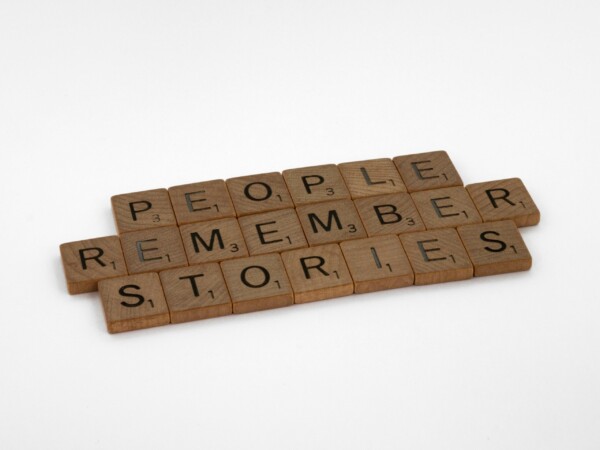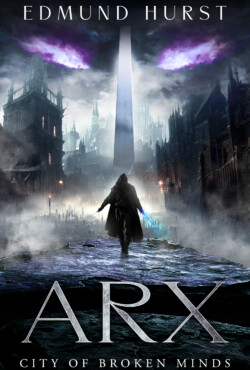Burning Memories as Fuel for Worldbuilding (Part I)
February 4, 2025

Barbican author and Programme Director for Creative Writing at the University of Hull, Edmund Hurst reflects on the writing process, the genre of Fantasy, and how memory helped shape his debut novel Arx: City of Broken Minds. Over the coming weeks, he will share three posts, each with a writing exercise to help worldbuilding. Here, he focusses on childhood and the perception of reality.

‘Reality burns. Inhale the memory.’
I love New Year’s resolutions. Love them so much that I make the same ones every year. Read more. Write more. Do something new. Finish the damn book.
Except this year, for the first time since I can remember, that last one is already accomplished. For the last twenty years, since I was twelve years old, some form of the manuscript that would become Arx: City of Broken Minds has sat on my desk waiting for new chapters, complete re-writes, edits, spellchecks, unanswered emails from supervisors and publishers that I am definitely going to get to in the new year, pinky promise…
But last year, in September, Arx finally made its way out into the world. Which means in 2025, for the first time, I’ve started the year Arx-less. And it feels… good? It felt amazing at the time. The book launch, surrounded by staff, students, friends, family and loved ones is a memory I will always cherish.
Twenty years is a long time to carry a story with you. Arx has been with me for pretty much every memorable moment in my life. When I broke my elbow trying to leap-frog over a bike rack, it was writing Arx that helped my recovery and gave me the movement back in my arm. When I left home for the first time, it was Arx on a thumb drive that captured all the experiences of my old life whilst allowing me to start a new one. I was able to complete a PhD by writing, changing and defending Arx. I was writing Arx when I fell in love. Twice.
At least, those are the stories I tell myself. The lies that I use to define who I am. Because really, that’s what memory is – right? A lie we repeat internally often enough that it becomes our truth. Talk to a sibling about childhood, or a colleague about a group project and you’ll find very quickly that we all have different memories of the same event. Its why humans make such terrible eyewitnesses. We don’t collect facts. We collect stories. Narratives of chaotic events that we misremember until they form an order that makes sense to us – then we call that the truth.
And isn’t that wonderful? Lying is what Fantasy does best. It’s the reason I write it. All authors lie, of course, it’s our bread-and-butter. But Fantasy lies about reality itself. The best Fantasy believes its own lies so firmly that they can become the truth. Writing Fantasy is the closest thing we have in our lives to real magic. Terry Pratchett put it best – “the place the falling angel meets the rising ape”. We have to believe in things that aren’t real. How else can they become? If you’ve never read Hogfather, this is your excuse.
Arx is a story of how the memories we hold can come to define us – and crucially, how we have far more autonomy in our definition of self than we might think. Likewise, the world of Arx is one shaped by my own memories. Of the experiences I collected whilst writing – and how those experiences, intentional or otherwise, coalesced into a world.
Burning your Childhood
‘You ever tried to tell an emotion that it’s lying to you?’
Worldbuilding can be somewhat of a misnomer. An entire world is enormous. Just living in one is exhausting. Even if you could spend every day on Wikipedia attempting to define our current lived reality, in a hundred lifetimes you wouldn’t even scratch the surface. And reality is easy – is this table hard or soft? Hit it and find out. So why do we put that same level of expectation on a world that can morph and shift in an eyeblink? A place that can change entirely based on the strength of a particularly vivid dream we had?
Worldbuilding is often more akin to creating a terrarium. We take small, representative parts of the world we want to create – place them in a glass-fronted box – and trust our readers to make the connection.
Our perception of reality can be shaped the same way. That ‘big picture’ thinking that is the result of taking in global conflict and events that filter through to us and turning them into symbolic guidelines that shape our perspective on human lived experience. Fantasy thrives here. In refracting that lived experience, through the lens of the impossible, into something new.
What is the first global conflict that comes to mind when you think about it? I was nine years old on September 11, 2001. In fact, my family had just returned home from visiting an uncle in the USA that summer. During that trip, we’d travelled on one of the flight paths that was eventually hijacked. Never Forget is a powerful phrase.
At the heart of Arx, the Iactura stands tall. A metal pillar, taller than any other, forged from the memories the people of my world have chosen to forget. The point of connection that all share – a single spike of pain through the cultural consciousness of an entire group of people.
Exercise 1
Bring to mind the first large-scale conflict that broke into your consciousness. Search your memories for the first time you really remember something had happened beyond your home, beyond your immediate circle.
Don’t google it. You’re writing Fantasy, not fact. This exercise is about you, no-one else.
Write down everything you remember about this event. What did it teach you – rightly or wrongly – about the world? How did it change who you are?
Now transform this feeling into something physical. Something that doesn’t exist – potentially can’t exist in reality. A location, a monument, an object. A single, tangible, visible, experiential thing that represents a moment that changes everything.
Part II is now available. Read it here.
Images courtesy of Brett Jordan, Roberto Catarinicchia, Jordan Whitt and Aaron Burden via Unsplash.




